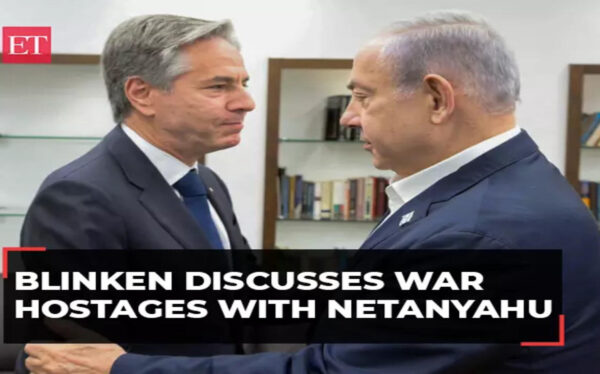By Paul Adams, Anthony Zucker & Graeme Baker
Israel has rebuffed US Secretary of State Antony Blinken’s call for a “humanitarian pause” in Gaza.
Mr Blinken said he had discussed the idea with Israeli Prime Minister Benjamin Netanyahu and other officials during their talks in Tel Aviv.
But in a TV statement minutes later, Mr Netanyahu said Israel rejected “a temporary ceasefire that does not include the release of our hostages”.
He said that Israel was “continuing with all our force” against Hamas.
The US diplomatic effort came as Israel pressed its offensive against Hamas, with commanders saying that their forces had encircled Gaza City and were engaged in a “complex urban fight”.
Israel’s offensive – involving air strikes and ground forces – was launched in the aftermath of the attack on 7 September during which Hamas fighters killed 1,400 people in Israel and and took more than 240 hostages.
Israel’s revenge attacks have killed at least 9,200 people in Gaza since then, according to the Hamas-run health ministry.
In his visit to the country, Mr Blinken offered a message of continued US support and sought assurances that Israel would take “concrete steps” to protect Palestinian civilians.
“A number of legitimate questions were raised in our discussions today, including how to use any period of pause to maximize the flow of humanitarian assistance, how to connect the pause to the release of hostages, how to ensure that Hamas doesn’t use these pauses or arrangements to its own advantage,” Mr Blinken told a news conference in Tel Aviv.
He noted that more than 100 aid trucks entered Gaza in the past 24 hours, where none were permitted until recently, but said that this was still not enough.
Mr Blinken, on his second trip to the region in a month, said the US had provided Israel advice on how to minimise civilian deaths while still trying to “finish” Hamas. And he said he had discussed tangible steps on allowing more aid, including fuel, to reach Gaza.
But the idea of a humanitarian pause does not appear to be on the agenda for the Israel government.
In his TV address, Mr Netanyahu said: “Israel is refusing a temporary truce that doesn’t include the release of our hostages.”
The Israeli leader was adamant that he will not allow any fuel into the Gaza Strip. He has also rejected all talk of a ceasefire.
What Mr Blinken was trying to achieve is something much more modest, but Israel wants to make sure that Hamas cannot take advantage of any break in the fighting.
The US secretary of state also said that Israel would only gain security through the creation of a Palestinian state.
Reiterating longstanding US policy on a two-state solution, he said: “Two states for two peoples. Again, that is the only way to ensure lasting security for a Jewish and democratic Israel.”
In comments made at a news conference beside the Israeli President Isaac Herzog, Mr Blinken said the US stood “strongly with Israel it has the right and obligation to defend itself and to ensure the events of 7 October never happen again.”
Mr Herzog said Israel was going to great lengths to warn Gazans of airstrikes, as he held up a pamphlet that he said was being dropped in the Strip telling civilians to leave the war zone in the north.
As the two men spoke, protesters could be heard shouting on a loudspeaker from a nearby street – families of Israelis who had been taken hostage.
Mr Herzog said that his “heart goes out to them”, while Mr Blinken added that the US was thinking “every single moment of our hostages”.
“So many, both Israelis, Americans, other nationals – and we’re determined to do everything we can to bring them back safely to be with their families and loved ones,” he added.
The US secretary of state later travelled to Jordan, which earlier this week recalled its ambassador from Israel.
For the next three days, Mr Blinken will meet with Arab leaders who have become increasingly outspoken in their criticism of Israel’s actions in Gaza.
BBC


Leave a Reply
You must be logged in to post a comment.